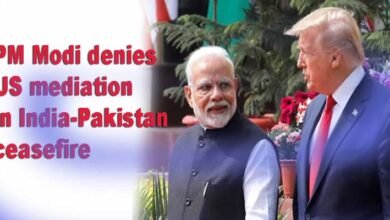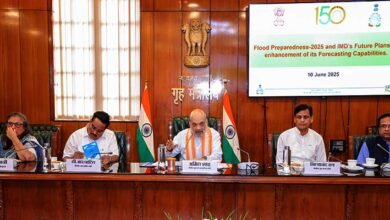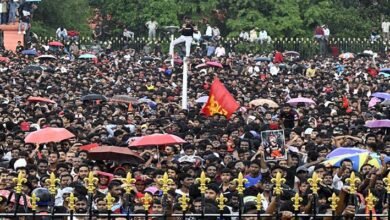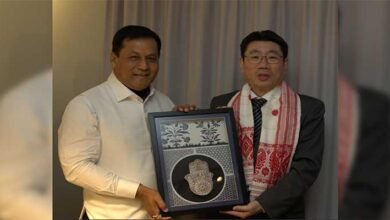Supreme Court Hearing on Waqf (Amendment) Act, 2025 Day-1
The hearing was conducted before a three-judge bench comprising Chief Justice of India (CJI) Sanjiv Khanna, Justice Sanjay Kumar, and Justice K.V. Viswanathan.

Supreme Court Hearing on Waqf (Amendment) Act, 2025 Day 1– The Supreme Court of India commenced hearing a batch of 73 petitions challenging the constitutional validity of the Waqf (Amendment) Act, 2025. The hearing was conducted before a three-judge bench comprising Chief Justice of India (CJI) Sanjiv Khanna, Justice Sanjay Kumar, and Justice K.V. Viswanathan.
The petitions, filed by a diverse group of petitioners including political leaders, religious organizations, and individuals, raised significant concerns about the Act’s impact on the religious autonomy, property rights, and constitutional protections of the Muslim community.
Also Read- Hundreds Protest Against Waqf Act in Silchar, Clash with Authorities
The hearing focused on preliminary arguments, with no interim orders passed, and was adjourned to April 17, 2025, at 2:00 PM for further deliberation. This report summarizes the key arguments presented by advocates, the court’s observations, and the broader context of the case.
Advocates’ Pleas and Arguments
The hearing saw robust arguments from senior advocates representing the petitioners, including Kapil Sibal, Abhishek Manu Singhvi, Huzefa Ahmadi, Rajeev Dhavan, and C.U. Singh, among others. Solicitor General Tushar Mehta represented the Central Government. Below is a summary of the key pleas and arguments:
Senior Advocate Kapil Sibal (for Jamiat Ulama-i-Hind and Others):
Sibal argued that the Act constitutes a “parliamentary usurpation” of the Muslim community’s religious rights, particularly through the inclusion of non-Muslims in the Central Waqf Council and Waqf Boards. He cited Article 26, asserting that the Muslim community’s right to self-governance in religious matters is violated. “Only Muslims had been part of Waqf Council and Boards, but now even Hindus can be a part of it. This is direct usurpation of fundamental rights,” he stated.
Sibal challenged Section 3(r) of the Act, which requires a person creating a waqf to prove they have practiced Islam for at least five years. He questioned, “Who is the State to tell us how inheritance will be in my religion? If I am born a Muslim, why should I have to prove this? My personal law applies.”
Also Read- Murshidabad Protests Against the Waqf (Amendment) Act-2025
Sibal criticized the designation of district collectors to decide waqf property status, arguing that it makes the collector “a judge in his own cause,” as they are government officials. He stated, “This is per se unconstitutional. The property will not be a waqf till the officer decides so.”
Sibal highlighted that the Act’s limitation provisions could legitimize encroachments on waqf properties by allowing claims of adverse possession, further diluting waqf protections.
Senior Advocate Abhishek Manu Singhvi:
Singhvi strongly opposed suggestions that the case be relegated to a high court, arguing that the Act has “all-India ramifications” and requires adjudication by the Supreme Court. “What is the point of getting multiple judgments from the high courts?” he asked.
Singhvi sought an interim stay on the Act, describing its provisions as “pernicious” and arguing that they irreversibly dilute statutory protections for waqfs.
He noted that four out of eight lakh waqf properties are designated as “waqf by user,” and removing this doctrine by “one stroke of a pen” threatens their status. He referenced the Ayodhya judgment, which acknowledged the historical significance of waqf by user.
Singhvi argued that collectors and designated officers are “the worst of choices” to decide waqf status, as they lack expertise and impartiality.
Senior Advocate Huzefa Ahmadi:
Ahmadi emphasized that “waqf by user” is an established practice in Islam and cannot be legislatively erased. He argued that its removal threatens the legal status of numerous waqf properties.
Senior Advocate C.U. Singh:
Singh argued that Article 26 protects the right to manage property for religious and charitable purposes without requiring the property to be an “essential part of religion.” He contended that the Act’s restrictions undermine this right.
Solicitor General Tushar Mehta (for the Centre Govt):
Mehta defended the Act, highlighting that it was passed after an extensive process, including 38 sittings of the Joint Parliamentary Committee (JPC) and the examination of 98.2 lakh memorandums.
Responding to concerns about the removal of “waqf by user,” Mehta argued that the Act provides enabling provisions, allowing Muslims to opt out of waqf arrangements for charitable purposes. He stated, “If as a Muslim and I want to do charity, I can come out of the waqf. It is an enabling provision.”
Mehta requested two weeks to file a detailed reply on behalf of the Centre, which the court accepted.
Senior Advocate Harish Salve:
Salve, representing a petitioner challenging provisions of the Waqf Act, 1995, argued that many provisions retained in the 2025 amendments reflect the “draconian” nature of the original law. He suggested that the Supreme Court should consider both the 1995 Act and the 2025 amendments holistically to avoid reverting to problematic provisions if the amendments are stayed.
Advocate Vishnu Shankar Jain:
Jain, representing a petitioner, argued that the 2025 Act retains “draconian” provisions from the 1995 Act, such as those allowing non-Muslims to challenge waqf status only through waqf tribunals, which he deemed unfair. He sought a stay on these provisions alongside the amendments.
Court’s Observations and Proceedings
The bench outlined two primary questions for both sides to address:
- Whether the Supreme Court should hear the case directly or relegate it to a high court, or call up related high court petitions for a consolidated hearing.
- The specific provisions of the Act being challenged and the arguments supporting their unconstitutionality.
Key observations by the bench included:
CJI Sanjiv Khanna expressed “genuine concern” over the removal of the “waqf by user” doctrine, noting that many waqf properties, including potentially the land under the Delhi High Court, are designated as such. He clarified, “We are not saying all waqf by user is wrong, but there is genuine concern.” The court sought clarification from the Centre on how such properties would be registered without requisite documents.
The bench asked the Centre whether it would allow Muslims to be part of Hindu religious trusts, probing the consistency of the Act’s provision for non-Muslim representation in waqf bodies.
Responding to Sibal’s arguments, CJI Khanna noted that Article 26 does not bar Parliament from enacting laws regulating religious properties, citing examples of Hindu endowment laws. He stated, “Article 26 is universal and secular in the fashion that it applies to all.”
The CJI condemned violence that erupted in West Bengal’s Murshidabad following the Act’s passage, calling it “very disturbing.”
The court declined to pass any interim orders, including a stay on the Act, and emphasized that it was not hearing arguments on a stay at this stage.
CJI Khanna proposed three options: the Supreme Court deciding the case, relegating it to one high court, or consolidating high court petitions for a Supreme Court hearing.
The court issued a notice to the Centre, directing it to file a response within two weeks, and adjourned the hearing to April 17, 2025, at 2:00 PM.
The hearing occurred amid significant political and social contention. Opposition parties, including Congress, AIMIM, DMK, Aam Aadmi Party, YSRCP, Trinamool Congress, and Samajwadi Party, have labeled the Act “anti-Muslim” and “unconstitutional,” citing its potential to undermine Muslim religious autonomy.
Petitions were filed by prominent leaders such as AIMIM MP Asaduddin Owaisi, Congress MP Mohammad Jawed, TMC MP Mahua Moitra, RJD MP Manoj Kumar Jha, and AAP MLA Amanatullah Khan, among others. Religious organizations like the All India Muslim Personal Law Board, Jamiat Ulama-i-Hind, and Samastha Kerala Jamiathul Ulema also challenged the Act, arguing it disrupts the democratic structure of waqf governance.
In contrast, the Central Government and six BJP-ruled states defended the Act, arguing it promotes transparency, accountability, and socio-economic upliftment. Haryana emphasized the need for reform due to incomplete property surveys and irregular records, while Madhya Pradesh described the Act as a “legally robust and technology-driven system.” Assam highlighted the Act’s bar on declaring land in Scheduled or Tribal Areas as waqf, which it deemed necessary.
Two Hindu petitioners, including advocate Hari Shankar Jain, challenged the Act’s retention of “waqf by use” provisions, alleging they enable illegal encroachments on government and Hindu religious land. A Sikh petitioner, Daya Singh, argued that the Act’s bar on non-Muslims creating waqfs violates Sikh values of interfaith charity.
Meanwhile, the Supreme Court’s hearing on April 16, 2025, marked the beginning of a critical legal battle over the Waqf (Amendment) Act, 2025. The advocates’ pleas underscored deep concerns about the Act’s impact on Muslim religious autonomy, property rights, and constitutional protections, while the Centre defended its legislative intent.
The court’s cautious approach, focusing on procedural clarity and substantive issues like “waqf by user,” indicates a thorough examination of the Act’s constitutionality. As the hearing continues on April 17, 2025, the case is poised to have far-reaching implications for waqf governance, religious freedom, and state authority in India.










